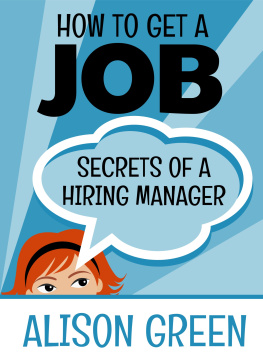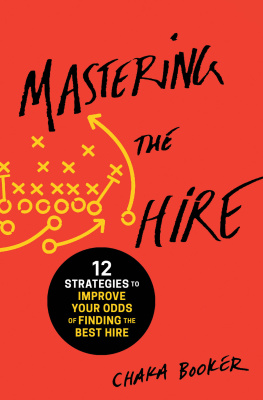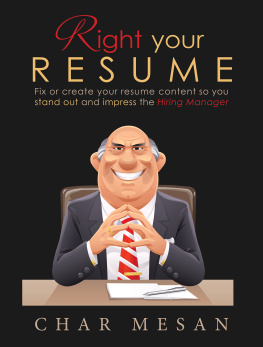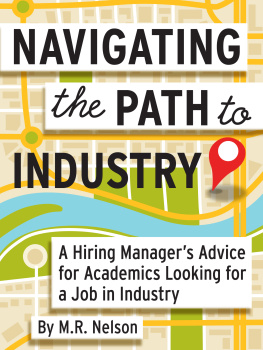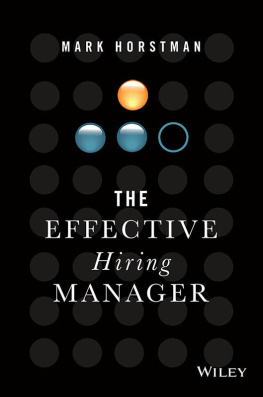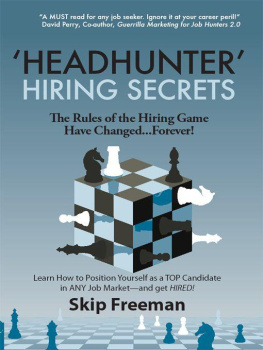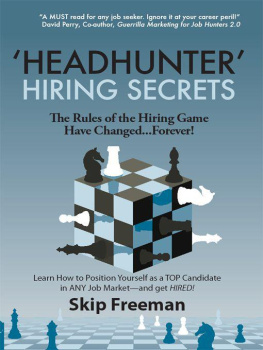table of contents
introduction
chapter 1: how to think about your job search
power dynamics and your job search
6 ways job-seekers sabotage themselves
chapter 2: the basics
your resume
your resume is a marketing document
the #1 way to market yourself with your resume
throw the one-page rule out the window
objectives: leave them off your resume
6 more things to leave off your resume
the phrase creative resume makes me nervous
can you use a different title that better describes your job?
listing volunteer work on your resume
listing temp work on your resume
should your resume include a job you left after a few months?
your cover letter
the point of a cover letter
how to customize your cover letter
so what does a good cover letter look like?
following up after submitting your application
phone interviews
surprise phone interviews
when a company calls you and then goes AWOL
the scheduled phone call that never rings
how to prepare for an interview
advice on nerves
interviews
the best interviews are a two-way conversation
common interview questions and how to handle them
weaknesses: why they care and why you should care
how to talk about a past firing
how to talk about a past lay-off
what to do if you have a bad interviewer
is that question legal?
questions to ask your interviewer
signs that your interview went well
yes, wear a suit
youve had your interview now what?
send a thank-you note
enthusiasm versus desperation
know their timeline
if you have your own time constraints, make sure they know
when you dont hear back after they said you would
when you still dont hear back, even when you call or email
references
who should your references be?
get permission
alert your references when they might get called
make it easy
references from your current boss
what to do about a bad reference
how to find out what kind of reference someone is giving you
when your company refuses to give references
if your references are being unresponsive
when your reference has left your old company
letters of reference: not worth your time
job offers
4 things to do when you get a job offer
how to juggle one job offer when youre waiting for another
reasons to turn down a job offer
how to turn down an offer
asking about pre-planned vacation time
giving notice at your old company
salary
requests for salary history
naming salary expectations
dont offer up salary info if its not requested
chapter 3: more things you need to know
what to do if youre overqualified
what to do if youre under-qualified
advice for recent grads
recovering from mistakes
what does it mean when a job is reposted?
what if the position is reposted after you were rejected? can you apply again?
applying for an internal job
how to apply for multiple positions at one company
job-searching long-distance
travel expenses
connections: how to use them and what to do if you dont have any
you might have them without realizing it
if youve ever held a job before, you have connections
how to use a connection when applying for a job
why you should volunteer
working with recruiters
gimmicks and the myth of standing out
chapter 4: how to read the company
how to find out if your prospective manager sucks or not
chapter 5: rejection
rejection is not a measure of your worth
does well keep your resume on file really mean anything?
2 ways to (potentially) turn a rejection into something positive
conclusion
introduction
If youre like many job-seekers, youre frustrated. And youve probably wished that you could see into the brain of a hiring manager to find out what on earth you need to do to get hired.
This book is that look into a hiring managers brain.
Now, obviously, hiring managers dont all share one pod brain. Different hiring managers do think differently. But the good ones have a very similar approach to what were going to talk about in here, and the good ones are the ones you want to end up working for. Speaking of which
Youre going to notice a theme running through this book, and its this: I want you to get the job thats right for you, not just any old job because life doesnt stop at the job offer it goes on after that, and if youre in a job that makes you miserable or that youre not good at, your quality of life will plummet.
Too many people approach job searching as if their only goal is to get a job offer, losing sight of the fact that this can land them in the wrong joba job they wont enjoy, a job theyll struggle in, or even a job they might get fired from. Your job search needs to be different than that, so that you get a job offer and good quality of life along with it.
So youll notice that throughout this book, Ill make a point of telling you about ways to self-select for the jobs youll be good at and enjoy, and to screen out the ones where you wont.
chapter 1:
how to think about
your job search
The hiring process is all about being judged, and thats nerve-wracking. A natural response is to want to measure up. But the wiser goal is to focus on learning whether you're a mutual match emphasis on mutual . Think of it like dating: If you approached every date determined to make your date fall for you, you'd miss important cues about whether or not you were right for each other.
This means giving the employer a glimpse of the real you, rather than trying to be someone youre not, so that they can make an informed decision about how well youd do in the job.
It also means interviewing the interviewer, asking questions to figure out things like: Is the work well aligned with your strengths your real ones, not ones you puffed up in your cover letter? Is the environment one youll thrive in or one that will drive you over the edge? Is the manager someone youd want to work with? Or is she flaky and disorganized? An unreasonable tyrant? A wimp who cant get things done?
If youre offered and accept the job, youre going to be doing this work with these people, all day, every day. Your goal is to find out if you can do it well and happilynot to get the job at all costs.
power dynamics and your job search
The fact that theres a power differential between job-seekers and employers can derail your job search and make you miserable, if you let it.
Employers have something you want, and that thing is hugely important: money and possible career happiness. Combine that with the fact that it can feel like employers wield their power arbitrarily, and many people respond by losing all assertiveness and feeling utterly helpless during the hiring process. They feel 100% at the mercy of employers, and when those employers act in ways that are confusing or inconsiderate, they feel helpless to change the situation.
Its a recipe not just for frustration, but for outright depression.
If you recognize yourself in the description above, you can and should change this.
How? Be your normal self, not your job-seeking self . Stop feeling like the employer is the source of all power in the world. Dont be deferential or suck up. Act like you are both businesspeople contemplating a relationship with each other, because you are.
Easier said than done, of course. But changing your mindset will make you feel a lot better. And I can promise you that it will not harm your chances of getting a job and it might actually help.
Here are some examples of what this means in practice:
Next page
